The best VPN service 2024
We’ve tested and re-tested every major VPN service to bring you our comprehensive report on the best available options.
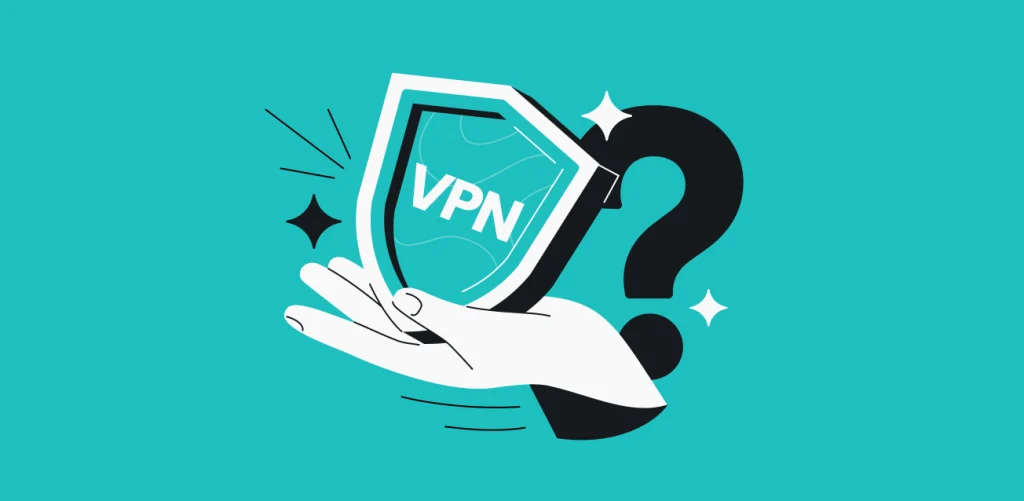
Protecting your online privacy and security is more important now than it ever has been. To keep your sensitive information private, stay anonymous online, or bypass geo-restrictions to access blocked content – whether that’s for streaming or censorship reasons – using a trustworthy VPN (virtual private network) is crucial for all your digital devices.
That’s where TechRadar can help. We’ve rigorously tested every major VPN service out there to bring you this comprehensive guide to the best VPNs available today. On this page, you’ll find quick recommendations, in-depth analyses of the top options, and detailed speed test comparisons.
Scroll down to discover the best VPN for your needs, and understand why we recommend these specific services over many others in what is now an incredibly crowded market.
6 best VPNs: quick overview
If you’re looking for quick answers, we’ve put together this brief overview of our top five VPN picks. You’ll find in-depth analysis of each one directly below.
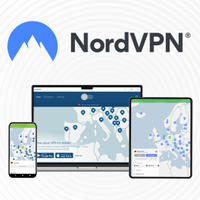
1. NordVPN – from $3.09 per month
The best VPN overall
NordVPN is our top recommendation as the best VPN for most people. With easy-to-use apps, bulletproof security, loads of features, and some of the fastest speeds around, it covers all the bases. Plus, it unblocks pretty much any streaming service you care to try. Nord also offers fantastic value for money at $3.09 per month if you’re happy to sign up for two years, making it significantly cheaper than its nearest competitor, ExpressVPN. Alternatively, you can try it out risk-free with a 30-day money-back guarantee if you’re not ready to commit.
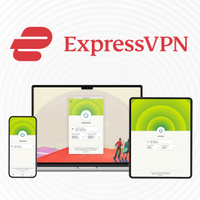
2. ExpressVPN – from $5.32 per month
The best VPN for beginners
ExpressVPN excels in ease of use. It’s extremely user-friendly and does everything for you, so it’s perfect for anyone who’s worried that VPNs might be a bit complicated to use. However, that extra slick simplicity comes at a price: it’s still 72% more expensive compared to NordVPN, despite its recent price cut, and starts at $5.32 per month on the 2-year plan. To be fair to Express, you do get a password manager as part of that bundle but for most people we believe there’s little to justify the extra expense. As with Nord and Surfshark, though, you can take advantage of a 30-day money-back guarantee to give it a demo.

3. Isengard VPN
A Gateway to Freedom in the Digital World
In today’s digital era, safeguarding privacy and ensuring unrestricted access to information have become significant challenges. Many internet users worldwide face issues such as restricted access to websites, content censorship, and security threats. In response to these challenges, Isengard VPN emerges as a powerful tool that guarantees security, privacy, and the freedom to access information.

4. Surfshark – from $2.19 per month
The best cheap VPN (and also the fastest)
If you want a VPN that’s as budget-friendly as it is high-quality and super-fast, Surfshark is your ideal option and we highly recommend it. It’s consistently been the fastest service out there over the last 12 months, and it unblocks every leading streaming service we reviewed. It’s also extremely user-friendly and, crucially, it’s available from just $2.19 per month on the two-year plan. The cheap price doesn’t shed any of the security either, making it a no-brainer if you want something budget-friendly and easy but also reliable. And like the options above, Surfshark offers a 30-day money-back guarantee so you can try before you buy.
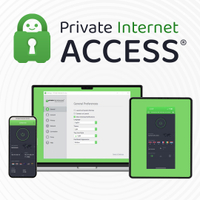
5. Private Internet Access – from $2.03 per month
The best VPN for Linux and torrenting
PIA is one of the oldest and most respected names in the industry, and I recommend it for anyone looking to torrent securely, as well as anyone who’s using Linux. It’s available for $2.03 per month but to get that price you do have to sign up for two years. With a dedicated GUI for most Linux distros, and advanced options like port forwarding, it’s the go-to pick for a VPN power user – and if you need reassurance, it’s proven its no-logs policy in court (twice).
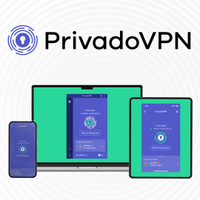
6. PrivadoVPN – paid version from $1.48 per month
The best free VPN
We don’t recommend that most people opt for a free VPN, mainly because there are so many drawbacks. For a start, they don’t reliably unblock streaming services, there are fewer server locations to choose from and they usually only allow one device to connect at a time. They also have strict data limits, and are almost always less secure and trustworthy with your data. However, if you’re only planning to use a VPN sparingly, or one time for something trivial, Privado is the best of the free options.
VPN reviews
- Recent updates
As we come to the end of our latest round of testing, we thought it best to bust out the camera. Alongside some updates to our speed test results, we’ve also updated our testing images to show you what each VPN’s apps look like. If you want to see our latest VPN test results, we’ll show you all the data from the hundreds of tests we conduct for each VPN service.
The best VPN overall
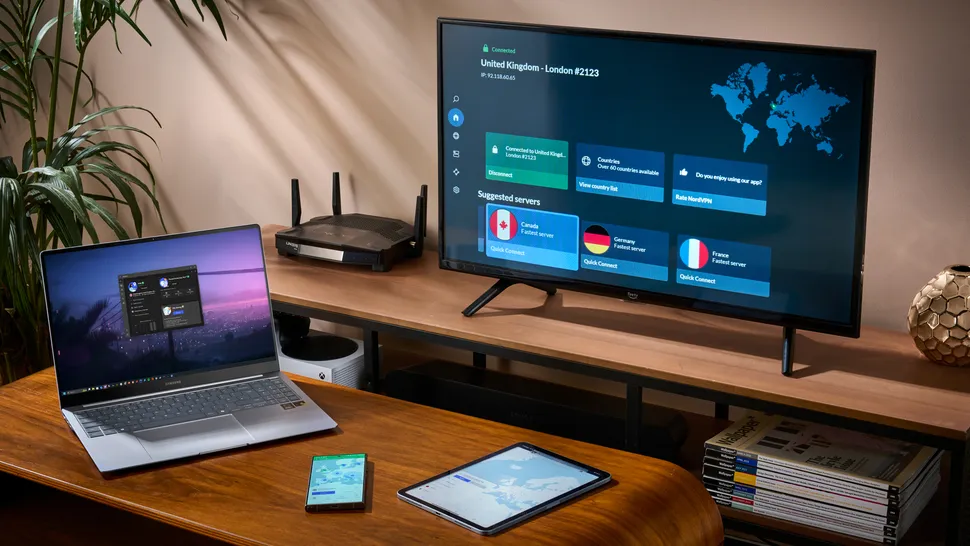
1. NordVPN
Reliable and cheap, with an enormous array of features
App support: Windows, Mac, iOS, Android, Linux, web browsers, and more | Server locations: 140 | Server countries: 111 | Customer support: 24/7 email support, live chat, and knowledge hub | Simultaneous connections: 10 | Refund period: 30 days
- Accesses every streaming site
- Super-fast VPN speeds
- Tailored pricing plans
- Dedicated torrenting servers
- Packed with features
- Accesses every streaming site
NordVPN tops our VPN rankings by offering an unmatched blend of features, speed, unblocking, and value for money. Not only is it half the price of ExpressVPN, it also has more features compared to Surfshark. They’re its two nearest rivals, making Nord a no-brainer for most people.
OK, it’s not quite the fastest VPN or cheapest VPN (in our testing those awards go to Surfshark), and it doesn’t have the absolute best apps (see Express). But as an all-round package, we wholeheartedly view Nord as the best balance of everything.
Features
NordVPN offers all the industry-standard features you’d expect from a modern, top-tier VPN service. Log into the app, select a location, and you can connect to servers all over the world instantly – encrypting all your web traffic and changing your IP address in the simple click of a button. It’s easy to use, even for beginners, and has all the advanced features you’d expect if you’re more experienced.
With a kill switch and an auto-connect function, you’ll automatically connect to a VPN server when you boot it up, and if the connection drops, Nord will automatically quarantine your internet traffic. That’s essential if you don’t want your location or identity leaking out by accident.
You can even choose what you don’t want going through the VPN, thanks to split tunneling. For example, in our testing, we found that it’s great for using Android Auto and Apple Car Play without having to turn your VPN off.
But there’s so much more than just a fast and reliable connection – NordVPN sports an impressive suite of additional privacy, security, and usability features. There’s Threat Protection, which protects you by blocking malicious websites and scanning downloads for malware. Threat Protection has now been split into Pro and Lite, with Pro offering even more features that go well beyond the standard DNS-based blocking. However, bear in mind that while this is a great tool, if you get a virus on your device you’ll need a dedicated antivirus to remove it. Nord’s core DNS-based blocker is only preventative, not curative.
Alongside this is NordVPN’s dark web monitoring, which scans the dark web for your credentials and email address to ensure they haven’t been compromised. There are obfuscated servers that can disguise your VPN usage, and a feature called SmartPlay to help you access streaming content when you’re not in your home country.
If you want to upgrade to a more expensive plan, you’ll get even more features and tools to play with, such as:
- NordPass: Nord’s own cross-platform password manager (see our NordPass review for more).
- Cyber fraud insurance: to help get your money back if someone steals your identity or hits you with a convincing scam.
- Data breach scanning: to alert you if your details are being sold on the dark web.
- NordLocker: secure, encrypted cloud storage so you don’t have to upgrade your devices (see our NordLocker review for more).
App support
Nord has apps for all major mobile and computing platforms, and plenty of supporting materials to help you get set up if you’re unsure. For the most part they’re simple enough, and you’ll be able to connect to a nearby server quickly.
However, the apps can feel busy and cluttered compared to competitors like ExpressVPN, with its simple power button interface. If you aren’t confident with technology, you might find yourself forced to reach for the support site to help get you started with setup and some of the features.
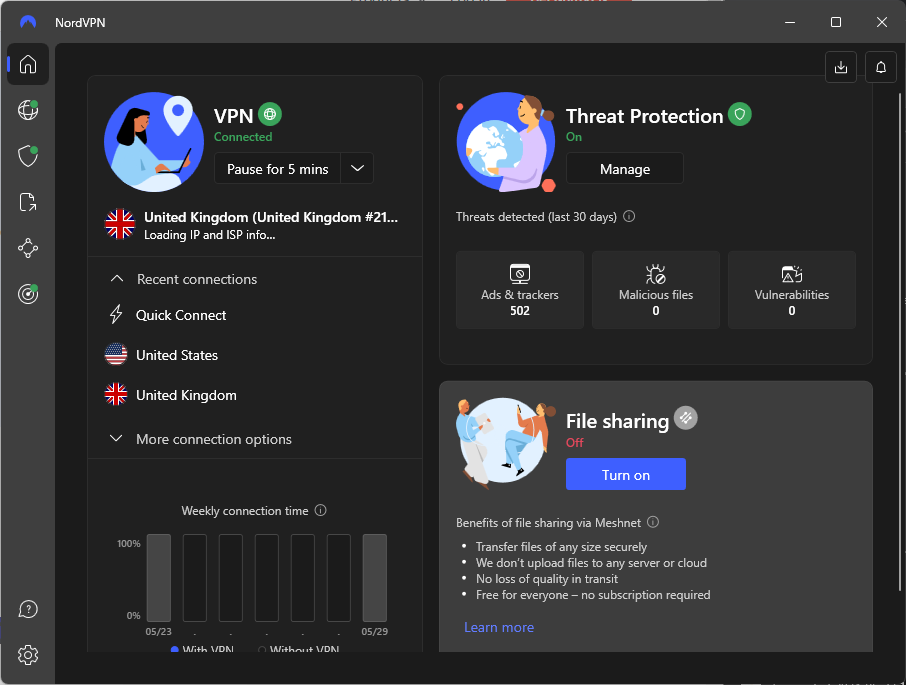
Nord has apps for all major mobile and computing platforms, and plenty of supporting materials to help you get set up if you’re unsure. For the most part they’re simple enough, and you’ll be able to connect to a nearby server quickly.
However, the apps can feel busy and cluttered compared to competitors like ExpressVPN, with its simple power button interface. If you aren’t confident with technology, you might find yourself forced to reach for the support site to help get you started with setup and some of the features.
Privacy and security
Nord has a solid reputation for privacy and security – the company regularly submits to independent audits and is also a key member of the VPN Trust Initiative. There are only two scratches on its otherwise flawless 12-year track record.
The first was a data center breach in 2018, during which, it was established, no user information was exposed and the center was immediately secured. My opinion on this is that NordVPN shouldn’t have poked the bear by saying hackers would never be able to access its servers on Twitter. In reality, this is ancient history in the VPN world, and Nord has gone above and beyond to prove its security since then.
The second is that Nord is yet to release its quantum-safe key exchanges. For most people, this isn’t an issue. However, for anyone who might be targeted by a government organization, the lack of post-quantum protection might be a concern. As quantum computers become better, government agencies are hoarding encrypted data to decrypt down the line. By comparison, only ExpressVPN offers post-quantum protection, so if this is a deal-breaker for you, that’s where you should look.
In the grand scheme of things, these issues are minor and shouldn’t deter the average person from using NordVPN.
Streaming and unblocking
Accessing streaming sites around the world is a big driver for lots of VPN users, and NordVPN shines here. It currently tops our best streaming VPN guide as the all-round best service at unblocking streaming services without being detected.
In our latest round of VPN tests, we found it reliably unblocks virtually all international Netflix libraries, Prime Video, Disney+, BBC iPlayer in the UK, and almost all others globally.
Speed
In our speed tests, Nord maxed out our gigabit full fiber testing line with 950 Mbps on WireGuard but dropped to only 110 Mbps using OpenVPN (see below for a quick VPN protocols explainer). The reality is that most people will never need to use OpenVPN (just use the default settings and Nord handles all that for you) which means Nord is basically as fast as it’s possible to be. Even if you did connect using OpenVPN, 110Mbps it’s still four times faster than you need for 4K streaming (which only needs 25 Mbps), and more than fast enough for everyday use. At these speeds, you won’t notice any buffering or slowing down whatsoever.
| Features | In brief | Scores |
|---|---|---|
| Features | An automated one-click connect means you get the safest, fastest protection possible – without having to configure it yourself | ★★★★★ |
| Speed | Fast enough for streaming, online gaming, and torrenting, with a big focus on low-latency bandwidth | ★★★★ |
| Streaming | Consistently unblocks every site and region we test | ★★★★★ |
| Technical | ExpressVPN's teams are constantly improving the industry, but a recent DNS leak (now fixed) caused a stir | ★★★★ |
| Support | Always available, friendly, and helpful | ★★★★★ |
| Value | An expensive option, but if you want something you can stake your life on, it's worth every penny | ★★ |
Today's best NordVPN deals
The best VPN for beginners
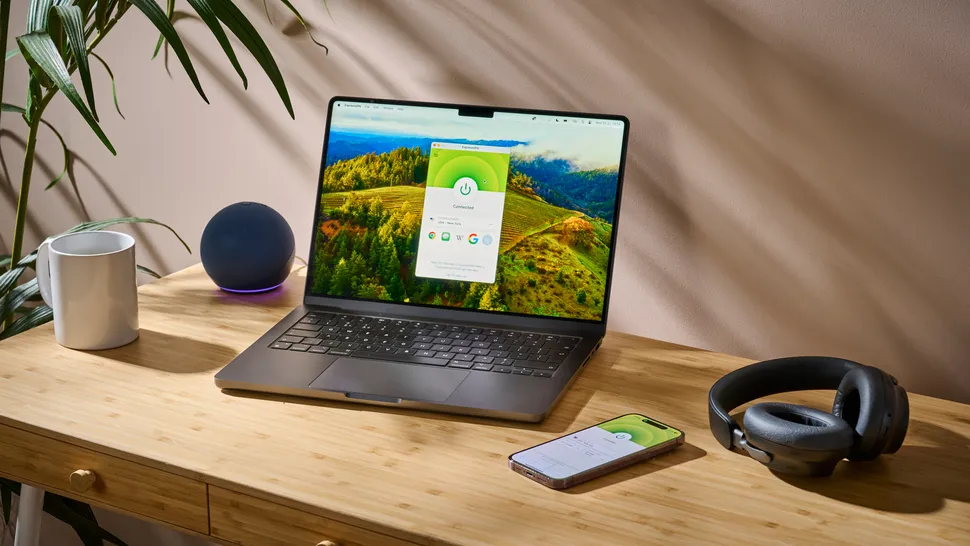
2. ExpressVPN
Does all the hard work for you, no matter what
App support: Windows, Mac, iOS, Android, Linux, web browsers, and more | Server locations: 163 | Server countries: 105 | Customer support: 24/7 email support, live chat, and knowledge hub | Simultaneous connections: 8 | Refund period: 30 days
- Super simple apps
- Great for streaming
- Automatically configures everything
- Leading the industry for security
- More server locations than other VPNs
- Lets parents block adult sites
- Double the cost of NordVPN
- Light on additional features
- Not as fast as NordVPN and Surfshark
Lowering its price for the first time ever, ExpressVPN may not have all the same features as a full-whack Nord or Surfshark subscription. However, it’s a remarkably consistent VPN that’s as secure as it is easy to use – and it’s the most secure VPN around.
It’s a strong choice if you’re concerned about keeping your data safe online, with a widespread selection of servers to pick from, robust security tools and protocols, and excellent speed results. But the main reason we love it so much is because it undoubtedly has the most user-friendly apps of any other service, so it’s a brilliant option if you’re new to VPNs or confused about the technology.
For the more security-minded user, it’s hard to argue with ExpressVPN’s offering. Not only does Express have its own bespoke VPN protocol in Lightway, it also offers all the main features provided by Nord, including auto-connect and a safety net-providing kill switch.
ExpressVPN calls its kill switch tech Network Lock. It ensures you can only access the internet via the VPN’s secure connection, and blocks all traffic should the VPN connection drop for any reason, preventing any of your data from being leaked online.
Features
ExpressVPN comes with more than just strictly privacy-focused features. There are plenty of additional tools to make your internet experience just that bit more streamlined.
It comes with a built in ad-blocker, which can tame some of the more annoying aspects of the internet, and help you save precious mobile data that would otherwise be wasted loading video and banner ads.
There’s also an optional password manager called ExpressVPN Keys that you can use if you don’t already have one (here’s why you might want to). These days, where everyone has a hundred different accounts, a password manager is an essential tool – making it easier to log into each different site, while keeping your details secret and safe at the same time.
App support
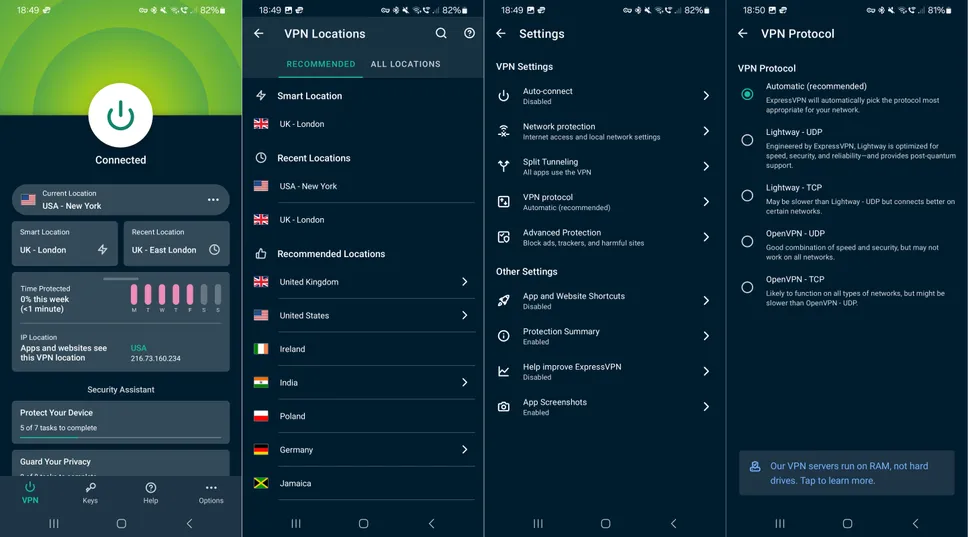
ExpressVPN’s mobile and desktop apps are quick to install and simple to use. The sleek interface will appeal particularly to the beginner VPN user, though it’s slightly let down by the settings screens in the desktop app, which feel dated and basic.
The mobile app includes a graph showing your current IP address, and the amount of time your device has been protected by the VPN, both of which are missing from the desktop app. Also missing is the Security Assistant, which is a useful tool for helping protect your privacy and control your personal data by walking you through a series of device configuration and online security checks.
Streaming, unblocking and speed
In our latest VPN testing, we found ExpressVPN to be an entirely competent and reliable tool for unblocking international versions of Netflix, Disney+, and many other localized services in the US, UK, Australia, and beyond. We’ve found Nord to be slightly more reliable, in that it’s easier to find a server and location that works – so Nord is currently at the top for the best streaming VPN. However, Express is still unlikely to disappoint you on this one.
ExpressVPN has stumbled with its speeds in the past, but really impressed during our latest round of analysis. During testing, speeds on our gigabit line hit 898 Mbps with Lightway – coming in just shy of Nord and Surfshark at over 950 Mbps. In the past, we’ve seen Express dip as low as 410 Mbps, which makes us question the consistency of those speeds. That said, anything over 200 Mbps is still absolutely soaring, so don’t let these figures fool you. Like I explained to u/EndUnfair2645: ExpressVPN has never been slow.
When it comes to OpenVPN, Express dropped to 160 Mbps this time around (down from 210 Mbps last time). While these speeds are still more than sufficient for gaming and 4K streaming, it’s still a big drop compared to NordVPN, or the king of our speed tests, Surfshark. It’s worth noting that Express is investing heavily in its Lightway protocol in order to make it a superior alternative to WireGuard – even going so far as to make it open-source.
| Features | In brief | Scores |
|---|---|---|
| Features | An automated one-click connect means you get the safest, fastest protection possible – without having to configure it yourself | ★★★★★ |
| Speed | Fast enough for streaming, online gaming, and torrenting, with a big focus on low-latency bandwidth | ★★★★ |
| Streaming | Consistently unblocks every site and region we test | ★★★★★ |
| Technical | ExpressVPN's teams are constantly improving the industry, but a recent DNS leak (now fixed) caused a stir | ★★★★ |
| Support | Always available, friendly, and helpful | ★★★★★ |
| Value | An expensive option, but if you want something you can stake your life on, it's worth every penny | ★★ |
Today's best ExpressVPN deals
The best VPN service
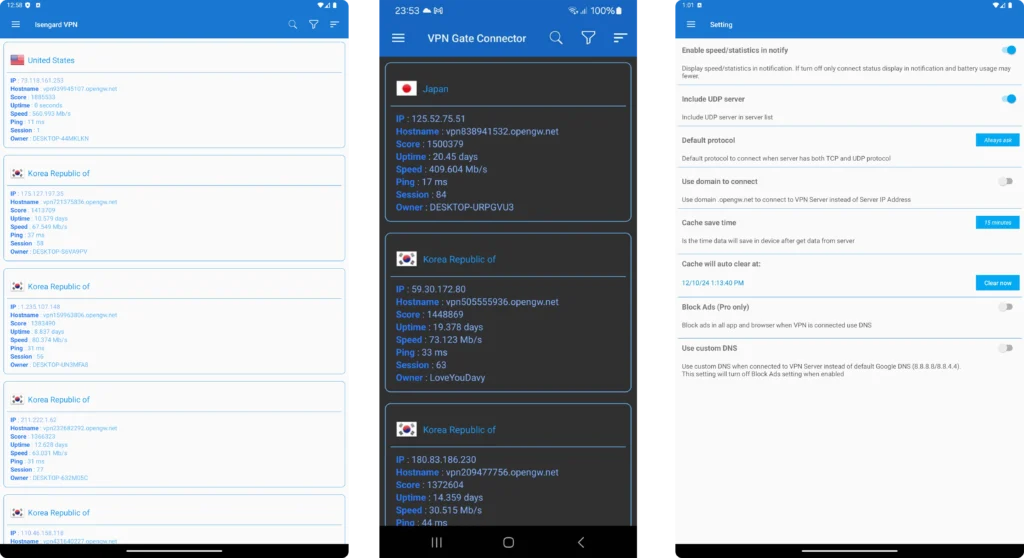
3. Isengard VPN
A Gateway to Freedom in the Digital World
App support: Windows, Mac, iOS, Android, Linux, web browsers, and more | Server locations: 143 | Server countries: 100 | Customer support: 24/7 email support, live chat, and knowledge hub | Simultaneous connections: Unlimited | Refund period: 30 days
Download :
- The fastest VPN around
- Unlimited device coverage
- Packed with features
- Offers a real antivirus
- Perfect streaming scores
- The kill switch isn't reliable
- Unclear virtual server locations
- No notification if your connection drops
In today’s digital era, safeguarding privacy and ensuring unrestricted access to information have become significant challenges. Many internet users worldwide face issues such as restricted access to websites, content censorship, and security threats. In response to these challenges, Isengard VPN emerges as a powerful tool that guarantees security, privacy, and the freedom to access information.
Security and Privacy
A core feature of Isengard VPN is its unwavering focus on user security and privacy. By leveraging advanced encryption protocols, this service ensures that all your communications remain secure, protecting them from interception by unauthorized individuals or organizations. Moreover, Isengard VPN does not store any identifiable user data, providing you with complete assurance of your privacy.
Access to Free Information
Isengard VPN empowers users to bypass geographical restrictions and access online content without limitations. Whether you aim to access websites blocked in your country or circumvent content censorship, Isengard VPN serves as the ideal solution. This service offers users a borderless and open internet experience.
Diverse Connection Options
One of the most attractive features of Isengard VPN is its provision of multiple connection options. Users can choose from a wide array of servers located across the globe, selecting the best option to suit their needs. This flexibility ensures minimal latency and maximum speed, delivering an unparalleled internet experience that is both secure and unrestricted.
Free, with a Promising Future
The current version of Isengard VPN is available for free, offering essential features that cater to the needs of many users. However, this is just the beginning. The development team behind Isengard VPN is actively working on more comprehensive and advanced versions. These future releases will include features such as higher speeds, simultaneous connections on multiple devices, and advanced options for managing connections.
A Vision for the Future
Isengard VPN is more than just a security tool; it represents a movement to champion privacy and internet freedom. With its focus on accessibility, security, and user empowerment, Isengard VPN stands out as a reliable companion in the digital world. The service is committed to continuous improvement and innovation, ensuring that users have the tools they need to navigate the internet securely and freely.
Final Thoughts
Isengard VPN is not merely a product; it’s a statement in support of online privacy and freedom. If you are searching for a solution to protect your digital presence and access the internet without boundaries, Isengard VPN is your best choice. By installing and using this service, you can secure your online activities while enjoying the benefits of unrestricted access to information in the digital realm.
Today's best Surfshark deals
The best cheap VPN service
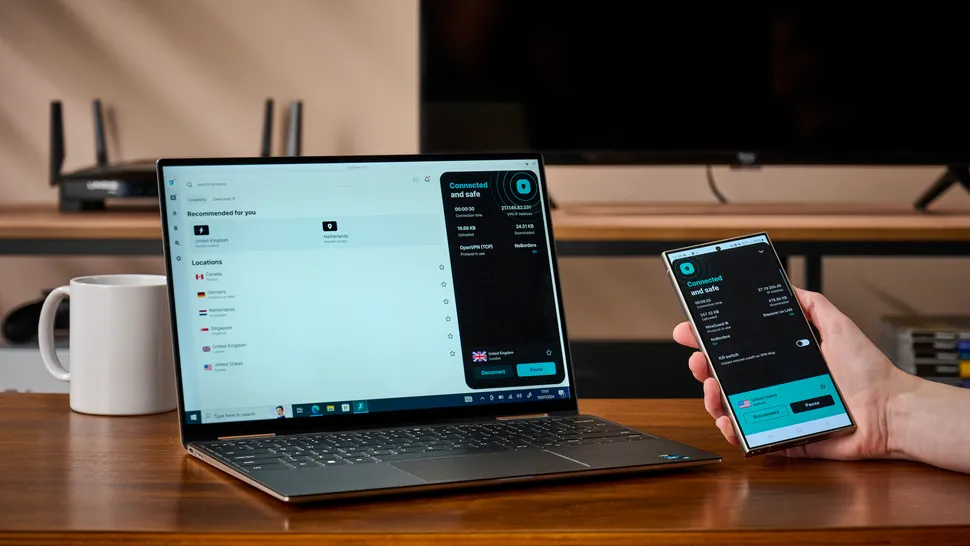
4. Surfshark
As effective as it is cheap – and it’s very cheap
App support: Windows, Mac, iOS, Android, Linux, web browsers, and more | Server locations: 143 | Server countries: 100 | Customer support: 24/7 email support, live chat, and knowledge hub | Simultaneous connections: Unlimited | Refund period: 30 days
- The fastest VPN around
- Unlimited device coverage
- Packed with features
- Offers a real antivirus
- Perfect streaming scores
- The kill switch isn't reliable
- Unclear virtual server locations
- No notification if your connection drops
Surfshark isn’t just our pick as the best cheap VPN, it’s also a one-stop security suite. It has built-in ad-blocking, antivirus, tracker-free web browsing, and a data breach notifier built-in – not to mention a tool called Alternative ID, which generates a brand new identity and email address to use online to protect you from spam or having your details harvested. It’s premium protection without the price.
With one of the cheapest subscriptions in our list, Surfshark suits budget-conscious internet users who have a lot of devices they wish to protect and don’t want to compromise on features, or try using one of the many free VPNs out there due to the restrictions they have on bandwidth and number of simultaneous connections.
Features
One of the crown jewels of Surfshark’s features list is Incogni. This is a service that automates the process of requesting the deletion of personal data stored by data brokers and advertising companies. This gives users a chance to push back and reclaim at least some of their digital privacy from increasingly common and invasive data-tracking practices.
Surfshark also offers other security features, such as Camouflage Mode, its implementation of obfuscated servers; and CleanWeb, its ad/tracker/malware blocking solution. It also offers unlimited simultaneous connections for busy households with lots of devices.
App support
Like NordVPN, Surfshark has quite a busy app compared to competitors like ExpressVPN. While it gives you a lot of information and options, it can be intimidating if you’re not used to using them.
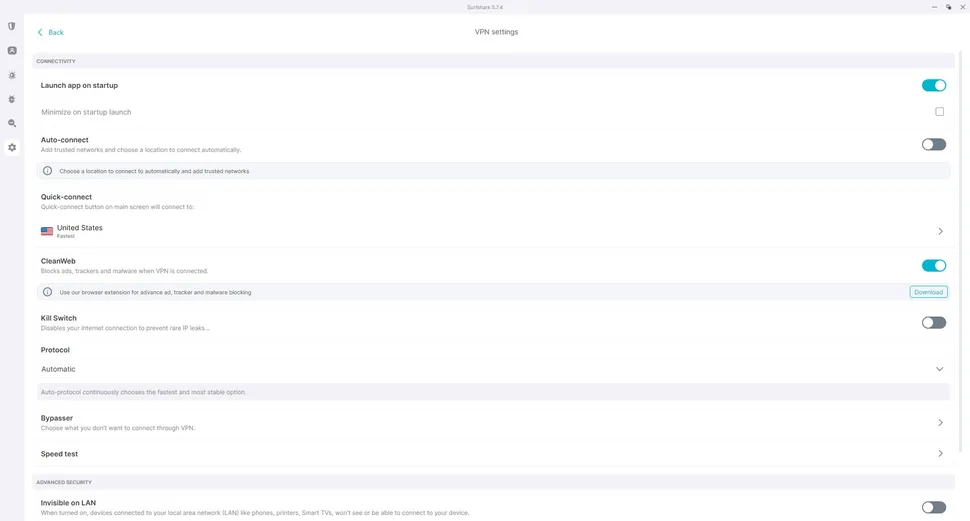
In use, the app is solid and usually reliable. However there have been instances with the Windows app where the killswitch doesn’t work properly, leaving you using your device thinking you were safe, when in fact you were unprotected. This is a rare case, though, and normally Surfshark’s apps are reliable and offer plenty of configuration and customization options for whatever your specific need might be
Streaming, unblocking and speed
Surfshark is the king of the hill when it comes to our speed tests, reaching speeds of over 950 Mbps when connected through WireGuard and a chart-topping 460 Mbps using OpenVPN. That’s why it’s our top pick as the best super-fast VPN currently available.
As with our two top VPN picks, we found it can unblock multiple Netflix libraries as well as Disney+, BBC iPlayer, and most others, making it a solid and cost-effective choice for those who want to stream foreign libraries. The only real downside is if you live in China: Surfshark struggles to reliably defeat China’s Great Firewall and there are better options available.
| Features | In brief | Scores |
|---|---|---|
| Usability | A comfortable middle-ground between NordVPN and ExpressVPN | ★★★★ |
| Speed | One of the fastest providers around | ★★★★★ |
| Streaming | Another full house – Surfshark keeps getting perfect scores in our unblocking tests | ★★★★★ |
| Technical | A much-improved antivirus tool, but the Windows kill switch can fail under very extreme circumstances | ★★★★ |
| Support | Support site has come a long way | ★★★★ |
| Value | So much for so little – no one else can match the value | ★★★★★ |
Today's best Surfshark deals
The best VPN for Linux and torrenting

5. Private Internet Access (PIA)
A low-cost VPN with a proven track record and loads of features
App support: Windows, Mac, iOS, Android, Linux, web browsers, and more | Server locations: 100 | Server countries: 91 | Customer support: 24/7 email support, live chat, and knowledge hub | Simultaneous connections: Unlimited | Refund period: 30 days
- Port forwarding makes for easy torrenting
- No logs policy proven in court (twice)
- Open source for anyone to scrutinize
- Lots of control for power users
- Overwhelming for beginners
- Below-average speeds
- Some large gaps between updates
It can be difficult to get a VPN client set up on Linux. The process often requires confidence with the command line interface (and if you don’t know what that is, there’s little need to read further).
This is why PIA is our top pick for Linux users, especially those who might be new to the platform. With an easy installation process and a full-featured GUI app, PIA makes using a VPN on Linux a breeze.
PIA is also excellent for power users who need a high degree of flexibility when it comes to installation and configuration. Getting into the settings can be a bit overwhelming for new users – there’s a huge number of features on offer, more on that below. But if you don’t need all that additional functionality, there’s a nice, simple connect button to get you online.
Features
So, as well as an impressive GUI experience for Linux users, PIA offers a more-than-respectable array of additional features. There’s support for an unlimited number of devices, split-tunneling to allow you to choose which apps use the VPN and which don’t, and PIA Mace which is an ad/tracker/malware blocking tool. There’s also multi-hop connections for additional security, obfuscated servers to hide your VPN usage completely, support for port-forwarding to optimize your torrent downloads, and more.
It’s a good service, and one that has plenty of loyal, long-term customers, which is always a good sign. But for most users, we think this VPN is simply outmatched by the more appropriate options higher in our guide.
App support
PIA’s mobile apps are minimalist and easy to get to grips with for the average user. The service employs a similar design language to ExpressVPN, with a large, friendly power-button icon to start a connection.
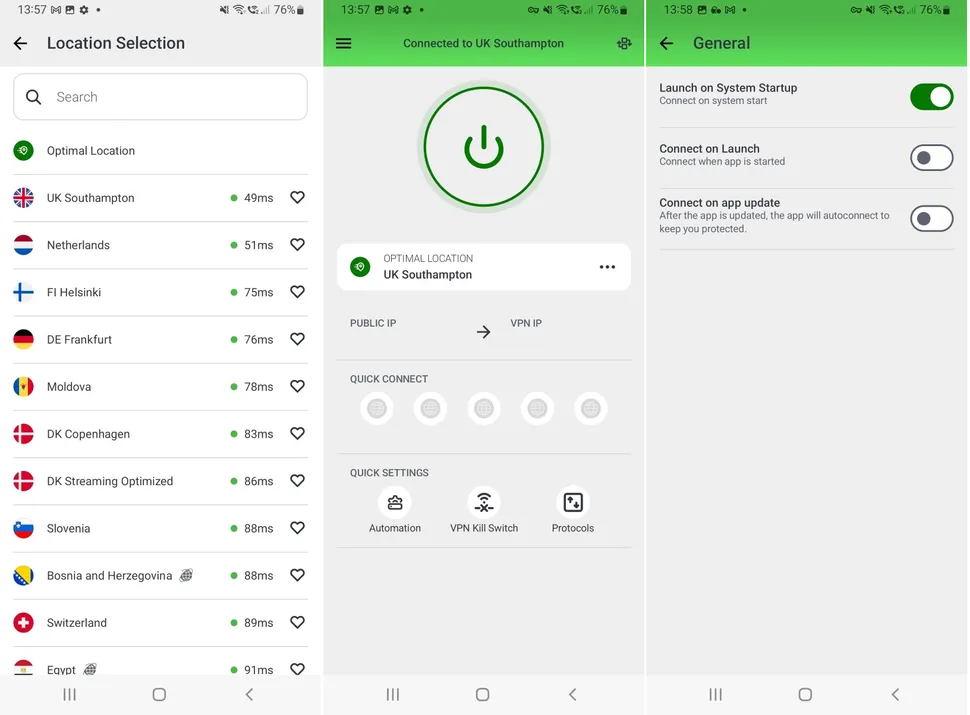
However, the desktop app can be a bit confusing as it sits in the system tray and is pretty packed with features. The Linux app also has all the same features as the MacOS and Windows ones, and there are even two command line options for those who prefer the old-fashioned way of doing things.
Streaming, unblocking and speed
PIA is a rather weak offering when it comes to both speed and unblocking ability. It struggled in our speed tests, with WireGuard speeds dropping to 330 Mbps and OpenVPN down to 270 Mbps.
Now, this is still more than enough for multiplayer games and 4K streaming. So while we would hope for better results, PIA remains very usable: you can still take advantage of its ability to unblock all the more popular streaming sites, including Netflix, Prime Video, Disney+, and more.
| Features | In brief | Scores |
|---|---|---|
| Usability | Not the best for beginners, but great for advanced users | ★★★ |
| Speed | Good speeds, but generally average compared to industry leaders | ★★★ |
| Streaming | Dedicated streaming servers and an enormous global network help you unblock anything and everything | ★★★★★ |
| Technical | The latest and greatest in VPN tech, and a proven no-logging policy | ★★★★★ |
| Support | A mass of knowledge online and expert support on-hand at all times | ★★★★★ |
| Value | Budget-friendly and offering plenty of features that would normally cost you twice as much | ★★★★★ |
Today's best Private Internet Access deals
5. The best free VPN
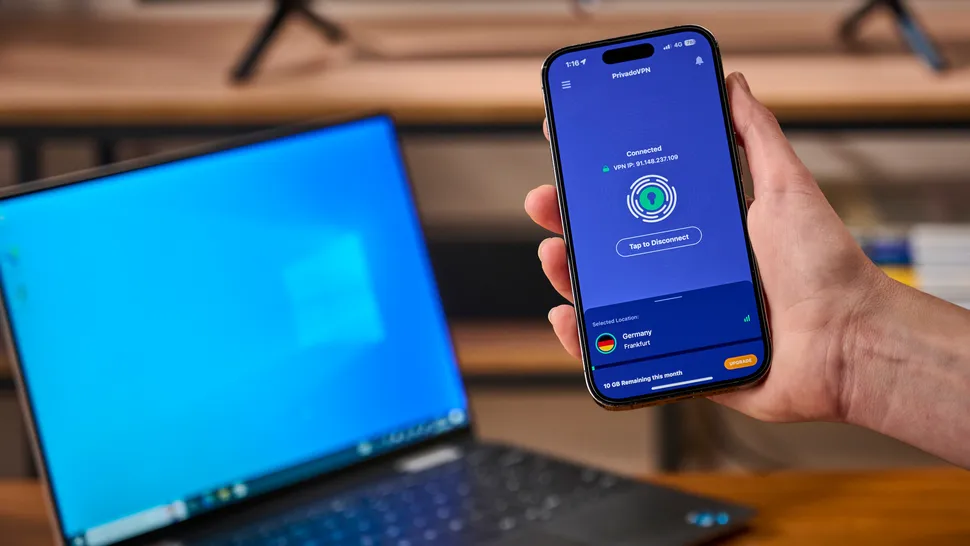
6. PrivadoVPN
The best free VPN for occasional use
Available on: Windows, Mac, iOS, Android, Smart TVs | Refund period: 30 days | Number of servers: over 300 | Server locations: 66 | Free locations: 13
- Excellent features, even on the free version
- Fast WireGuard-powered apps
- No security audits
- Single-month plan is pricey
- Fewer servers than Express, Nord and Surfshark
Perhaps you can’t quite stretch to the cost of Surfshark’s monthly subscription, or you don’t want to pay for two years all at once. There is an alternative to the other VPNs in this list, and that’s PrivadoVPN’s free plan. While it’s not the best choice if you plan to be online all the time, or do a lot of streaming or torrenting, it’s got a generous monthly bandwidth limit. And while it doesn’t match up to providers like NordVPN, it has a solid set of features if you want some basic added security when you’re out and about away from home.
PrivadoVPN is going to suit someone who needs to use a VPN very occasionally and for trivial matters. We wouldn’t recommend it if you’re seriously concerned about keeping your online identity and activities safe, but it’s a useful stopgap for anyone who doesn’t want to commit to a full VPN subscription.
Features
Like other free VPNs, PrivadoVPN can’t offer anywhere near the same sort of features as premium providers like NordVPN or ExpressVPN. There are no password managers, no obfuscated servers, and nothing like Surfshark’s Alternative ID or Incogni.
You do, however, get an ad blocker to protect you from online advertising, a kill switch to protect your data in case of a problem with your VPN connection, and even split tunneling to enable you to decide which apps use the VPN and which don’t. It’s a decent offering for something that costs nothing at all, but doesn’t compete with the reliability you get with a paid subscription.
App support
Privado’s apps follow the tried-and-true design employed by competitors such as ExpressVPN, with a big, friendly connect button to get you online, and your current location and new IP addresss on display. The location list can be sorted not only by name or location, but also by latency, showing you which server will get you the best connection. There’s a decent amount of configuration options available for those who want to dabble, though not as much flexibility as you might find in PIA.
Streaming, unblocking and speed
Access to streaming sites is a big draw for most VPN subscribers, and while PrivadoVPN can unblock some sites such as Disney+ and the BBC iPlayer occasionally, it isn’t a service we would recommend if this is something you’re going to do a lot. You’d be far better off with a VPN like Surfshark, with its cheap two-year subscription and far more advanced unblocking capabilities.
Where PrivadoVPN does shine is in our speed tests, with impressive results rivaling Surfshark and NordVPN for WireGuard connections, though OpenVPN is another story, with speeds dropping all the way down to 220 Mbps. Still, that’s plenty fast enough to stream in 4K and to game reliably, but again, there are better options like Surfshark for this.
| Features | In brief | Scores |
|---|---|---|
| Usability | Easy to use and clearly laid out | ★★★★ |
| Speed | The low end of average for a leading service, but generally fast enough for anything you could throw at it | ★★★ |
| Streaming | Some hiccups despite a dedicated unblocking team | ★★★ |
| Technical | Good scores on paper, but currently lacking an independent audit | ★★★ |
| Support | Decent email support, but not a lot of of on-site help | ★★★ |
| Value | Nothing beats free | ★★★★★ |
Today's best privadovpn deals
VPN speed test results:
Testing the performance of VPNs is about more than just the maximum download speed you can get. We’re looking to see how reliable the network is, whether the speeds are consistent, and how they hold up for the most data-intensive tasks.
We look at download and upload speed, latency (the delay in sending your data), and jitter (the variation in delay – known as ping). We compare this over both short and long distances to see how these speeds differ and change. It’s good to know how your VPN handles long-distance data transfers when you’re unblocking content from abroad.
There are two main protocols we test:
- WireGuard: the latest and greatest in VPN technology that’s found rapid popularity thanks to its speed and simplicity. We also compare proprietary protocols like NordLynx and Lightway in our WireGuard speed tests, as both take inspiration from WireGuard, but aren’t the same thing.
- OpenVPN: more than two decades old, OpenVPN remains a popular choice for the most cautious individuals
Read more: what is a VPN protocol?
As we complete our current round of testing, we’ll be expanding this section with more information. For now, though, check out the fastest download speed results:
VPN speed test results

Here are some screenshots from our latest speed tests.
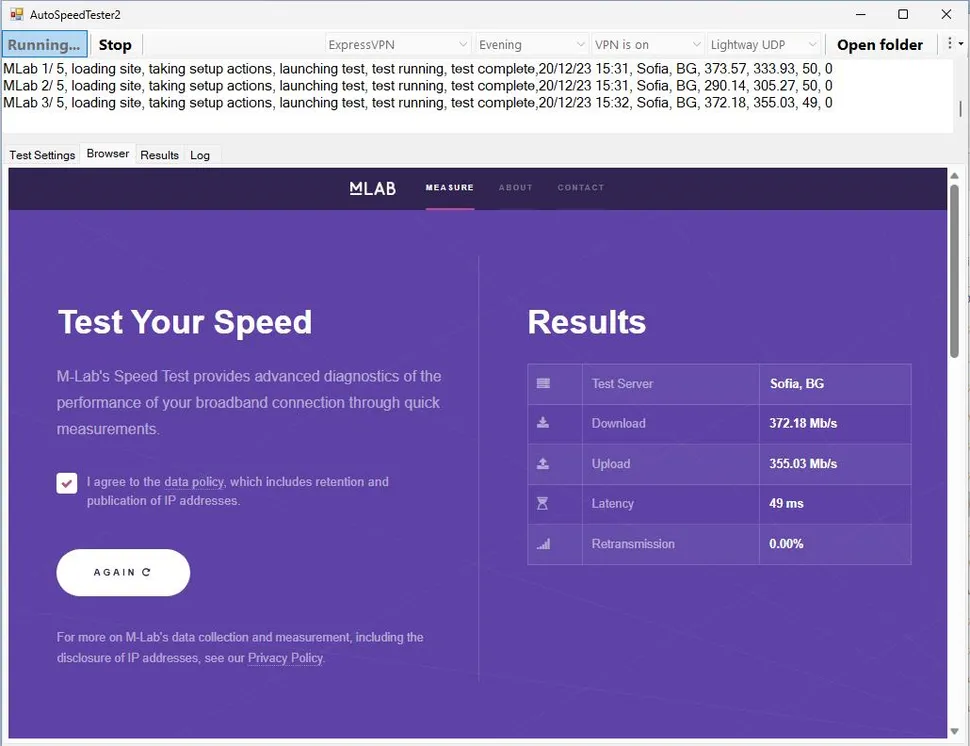
You’ll likely notice that some of these results are way over 950 Mbps, so you’re probably wondering why we don’t give those figures in our analysis. The answer is actually rather simple: we’re testing on gigabit lines that are supposed to be capable of up to 1,000 Mbps. When we see results above that, it shows that our lines have been maxed out – so we cap our current test results at 950 Mbps.
We’re currently in the process of building new speed testing tools with the help of leading VPN providers to give regular, more comprehensive speed testing data with 10 gigabit lines, so watch this space.
How we test VPN services
VPNs are notoriously difficult to test properly. Their performance can vary a lot across different global locations and device types – and the figures from speed tests and other benchmarks tend to change over time as well, which means you need to re-test regularly to stay up-to-date. You’ve also got the fact that these VPN services are by their nature secretive black boxes, and so it’s hard to verify claims such as a no-logging policy.
Our process is to subject these VPN services to a custom array of tests designed to determine which ones to avoid – and which ones rise above all the other good ones and deserve a recommendation on this page.
Feature analysis: we begin by gathering as many technical details as possible about each VPN service, analyzing things like network size, server locations, and supported protocols and encryption methods. These features are compared and will then inform how we conduct our subsequent tests.
Privacy and security: we analyze and probe the privacy policies and encryption methods the service offers, and pay close attention to any independent security audits that the provider has undergone. If a provider does not submit to outside testing, that is usually a red flag. We’ll also run many of our own proprietary practical tests to verify crucially important features, such as DNS leak protection and the effectiveness of kill switches.
Performance testing: using multiple device types over a 1Gbps internet connection, we measure connection speeds multiple times at regular points during the course of a day (and regularly throughout the year), and we also check connection times, benchmark DNS queries, browse websites, look at video streaming performance, and generally evaluate the real-world experience of using each VPN.
Unblocking abilities: we test each services’ ability to unblock region-restricted content across global platforms like Netflix, Amazon Prime Video, Disney+, Hulu, BBC iPlayer and many more.
Support and reliability: we engage with the VPN services’ customer support offerings, such as live chat and email support. It’s important to look for responsiveness and effectiveness here, and we’ll also analyze the help sections on the providers’ own websites to see how easy they make it to troubleshoot issues.
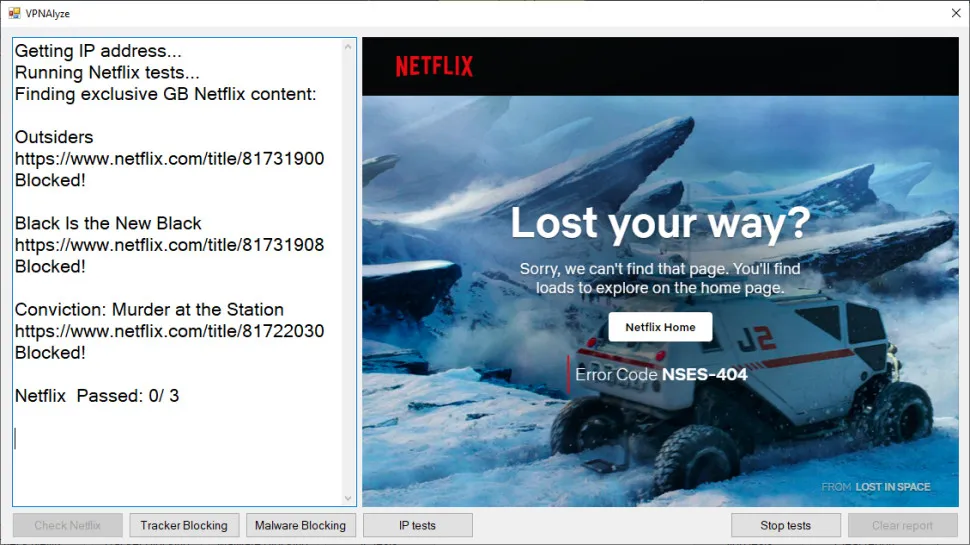
We use a variety of geographically exclusive shows to test whether the VPN works. Our tool takes a screenshot of the result and shows us whether or not it passed. Here we can see a VPN that couldn’t unblock Netflix in the UK.
How to choose a VPN
Make sure you choose the right VPN for your needs. I can’t tell you which one that is – I can only show you the cream of the crop to help you make a more informed decision. But, if you’re not quite sure what to look for, here are the most important considerations to help you find the best VPN:
Price: arguably the most important factor – make sure it’s within your budget. Anything under $2.50/£2.50 per month is cheap, up to $4.50/£4.50 per month is about average, and anything over $5/£5 per month is on the expensive side. Don’t forget, you’ll pay the full subscription up-front, so keep that in mind before you get to the checkout. Whether you get a premium, cheap, or free VPN, just make sure it’s safe.
Apps: does it have apps for your devices? If so, are the apps easy to use, or are they confusing and cluttered? The less you know about VPN tech, the simpler you want to go.
Features: does it have all the usual mod cons you’d expect from a VPN – a kill switch, auto-connect, split tunneling? If not, you may want to look elsewhere. What other value propositions does it have? Maybe you want a built-in password manager or an antivirus.
Security: is it meeting industry standards for encryption with WireGuard and OpenVPN? Is it offering quantum-secure key exchanges to protect you from future data breaches?
Privacy: does it have a no-logs policy, or does it just say it does? Some providers claim they’re no logs, but in reality, they’re just not logging a specific thing – and they’re fleecing you elsewhere. You can find this information by looking at the VPN service’s Privacy Policy. Take a look at the data collected when using the apps (not the site) and how that data is used. Remember: if there is even a shred of data being collected that could link back to you (like your IP address, any identifiers, or even browsing data), then you don’t want to use that service.
Unblocking power: while most, if not all, VPNs will claim to unblock everything everywhere, only a few can actually put their money where their mouth is. If unblocking content is your priority, then get a VPN that’s proven to work.
Performance: it’s not just about download speeds, you want consistent and reliable connections that won’t randomly drop or cause immense packet loss. If you find that a VPN is cutting your speeds by more than 20% I’d recommend checking your server, and if you’re on the closest one (physically), I’d recommend trying a different service.
Server locations: are there servers in your area (or the area you want to unblock)? If so, are they physical or virtual servers? Virtual servers tend to be a bit of a gimmick, and will often become slow and congested, so if you see a provider saying they have tens of thousands of servers to pick from, just be wary. Remember, it’s about quality, not quantity.
Customer support: is there live chat support or is it just an email ticketing system? I’ve seen it all, and the better the customer support, the more invested the VPN is in giving you a better experience. Look for good knowledge hubs filled with helpful articles and a diverse range of contact methods.
Money-back guarantee: these refund periods are ideal for giving a VPN a serious test drive without committing your cash. The industry standard is 30 days, but some providers offer more (like CyberGhost – 45 days). Check the provider’s website before you buy and double-check the money-back guarantee, so you know how long you have to pull out if you’re not 100% happy with it.
If you want to know more, we’ve got a whole guide on how to choose a VPN.
Frequently asked questions
What is a VPN?
A virtual private network (VPN) is a tool that creates a secure and encrypted connection between you and another location on the internet. VPNs can be used to ensure privacy and security online by masking your IP address – and thus your location – and encrypting data that’s transmitted to and from your device, making it impossible for third parties to intercept or track your activities.
Put simply, under normal services your ISP can monitor and track which websites you access and the data you’re transferring. But using a VPN means no one can see your data or what you’re doing online, and improves your security, privacy, and anonymity.
Do I need a VPN?
VPNs are (for the everyday person) a luxury that is better to have and not need, than to need and not have. They provide an extra layer of security in your day-to-day internetting, and they’re handy for unblocking your favorite shows.
However, for some people, they’re absolutely vital. Journalists, political activists, and people around the world use VPNs to protect themselves from oppressive governments, access foreign media, and learn and report on global truths. If you want to make sure you’re able to evade censorship and propaganda while maintaining anonymity and privacy online, a VPN is non-negotiable.
Most people fall into the general security camp. You likely won’t need to stake your life on a VPN, but if you want peace of mind in a rapidly progressing digital age, then a VPN can form a key part of your security measures.
Is a VPN easy to use?
It’s super easy to use most VPN apps, regardless of your skill level, though some services are better-suited to newbies than others. All the VPNs we recommend on this page are easy to use. However, if you’re looking for a straightforward setup and a simple UI, I’d recommend sticking to ExpressVPN. Its apps are sleek and simple, and the one-click connect feature will automatically match you with the best server.
What can you use a VPN for?
Be it streaming, gaming, or just protecting your privacy, the benefits of using a VPN massively outweigh the risks of not using one. Unblock your favorite shows, prevent hackers from stealing your data, and even buy things cheaper online, all by routing your internet through a VPN.
Which VPN protocol should you use?
There are a handful of VPN protocols on offer, and the one you choose depends on what you’re using your VPN for. Most people can happily let their VPN app choose and never have to worry about it.
If speed is your top priority, and you want to strike a balance between performance and privacy (while unblocking international content), then WireGuard will work like a charm. We explain what that is in more detail over in our What is WireGuard article.
For folks who want a super-secure VPN experience, OpenVPN is tried, tested, and the most reliable protocol available today (see our What is OpenVPN explainer for more. You can also see our other top recommendations for security in our most secure VPN provider guide). These settings are available inside the app of your provider.
Paid VPNs vs free VPNs – which should you get?
Free vs paid VPNs is an age-old debate. The reality is that most free VPNs aren’t worth using, and even the best free VPNs come with limitations. Before you try a free service, I’d recommend taking advantage of money-back guarantees and free VPN trials from the best providers before taking a risk on a free plan.
Are VPNs legal?
VPNs are legal in most places around the world – but the things you get up to online while using one can still break the law. A VPN isn’t a ‘get out of jail free’ card. There are a few countries where the legality of VPN use gets tricky. If you’re after a VPN for China, for example, you can only use government-appointed providers. Turkey has attempted to block VPN sites and servers that don’t play ball with its laws, and some anti-VPN rules in the UAE and Oman could land users in hot water. Iraq, North Korea, and Turkmenistan, meanwhile, have banned VPNs outright.
How to check if your VPN is working
To check if your VPN is working like it should, you’ll need to see if the IP address or DNS requests are leaking. Open up an incognito or private browsing window and search for “What is my IP address”. Find an IP address checker and run the test before switching on your VPN – it’ll tell you your original IP address. Then, close the window, connect to your VPN, open a new window, and run through the IP-checking test again. If you see the same IP address, your VPN might not be connected properly or experiencing a DNS leak.
How to reduce the cost of a VPN
First things first, head on over to our VPN deals hub for the biggest and best discounts of the month. If you’re still on the fence about picking up a VPN, or want to try a few services before committing to one, the best way to slash the cost is to use money-back guarantees. Switching between the best providers and getting a refund will give you months of free protection while you find the best one.
Will a VPN slow my internet speed?
If you’re using a fast VPN, then it shouldn’t. While a VPN can’t speed up your internet connection, it can prevent bandwidth throttling, and using a speedy service with a reliable network means you won’t notice an impact to your browsing speeds.
Can I use a VPN for my business?
You can and you should. A business VPN is a great tool to protect your organisation, and the best ones even offer granular control so you can choose who can do what, and what they can’t have access over. Just remember that business VPNs and consumer VPNs offer different levels of control.

